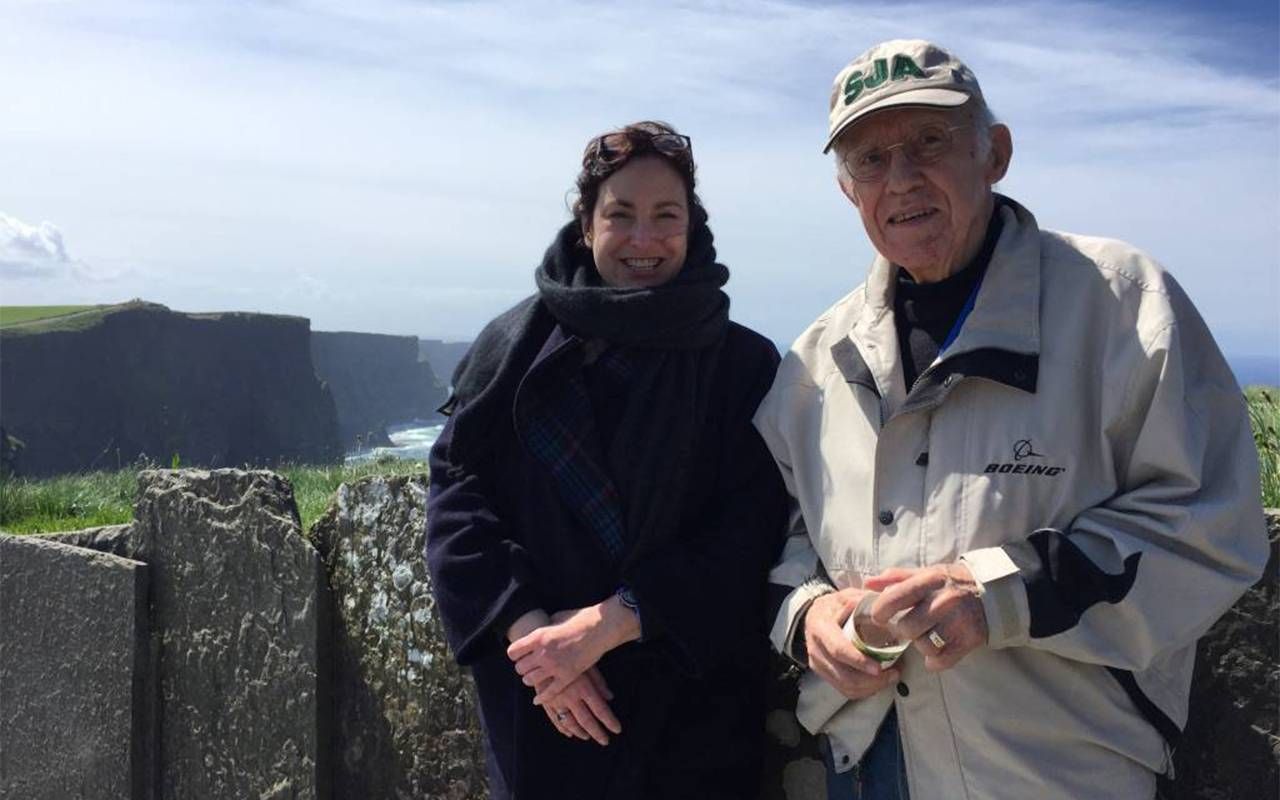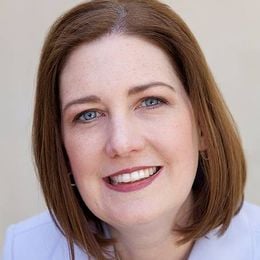Sharing Stories of Caregiving
On her podcast 'Twenty-Four Seven,' Emmy-winning producer Kitty Eisele speaks to the roles, challenges, and demands for caregivers in America — including her own experience
Emmy-winning producer Kitty Eisele, the host of the caregiving podcast, "Twenty-Four Seven," said it is very much part of the American consciousness that people have family demands regarding children, but she wants the demands that people have caring for older family members to be visible, too.

"It had become obvious to me, starting in 2013 when both my parents had bad falls, that I might need to step up and do more."
The third season of Eisele's Texas Public Radio podcast features an episode on the depictions of care and dementia in popular culture, which Eisele said need to be more visible, since Hollywood doesn't usually make movies about older adults.
Eisele recently interviewed bestselling author Walter Mosley, who wrote "The Last Days of Ptolemy Grey," a novel about a Black man with Alzheimer's who has to go back into his memory and solve some mysteries and crimes.
The novel was made into an Apple TV series this year with Samuel L. Jackson. Eisele said, "It took them 12 years to go from book to movie or TV because it wasn't an appealing story for Hollywood."
A Podcast Pivot
In season one of "Twenty-Four Seven," which launched in October, 2021, Eisele kept an audio diary. "The first season was [being released], and my dad died," she said. "We intended for the next season to continue this caregiving story and look at some of these other aspects of [caregiving] like institutional care, what happens with hospice and financial choices."
"But we had funding for another season; we pivoted, and I started to call other people, going through [caregiving] from different perspectives," she explained.
In January 2022, Eisele interviewed Patti Davis, Ronald Reagan's daughter, who wrote "Floating in the Deep End," a book about being a caregiver. "She ran caregiving and family support groups for many years after her father died of Alzheimer's," said Eisele.
"I felt like that book was so helpful, even though I read it right after my dad died, because it explained so much. He didn't have Alzheimer's, but the same lessons and issues came up. She was able to pinpoint and talk about how her support groups had navigated [caring for a loved one].
Another story featured on "Twenty-Four Seven" is about Cynthia Huling Hummel, a minister who has been diagnosed with Alzheimer's. Eisele spoke to Hummel about what it means to live with the illness. Eisele also interviewed Next Avenue Influencer in Aging, Ai-Jen Poo, about the challenges facing at-home caregivers.
Her Own Experience
It was as her parents began to age that caregiving became a personal issue for Eisele. She lives in Washington DC, and her parents lived in the Virginia suburbs. Her mother died in 2016 after experiencing health issues.
"We had been through the wringer, at least through the systems of care," she said. "It had become obvious to me, starting in 2013, when both of my parents had bad falls that I might need to step up and do more. At that point, they were in their mid-to-late seventies, living independently, doing volunteer work, writing and all sorts of projects."
After their respective falls, her mom and dad both had lengthy hospital stays in rehabilitation centers. Eisele was able to use family leaves for a few weeks, but it was evident to she and her sister that things can turn on a dime. After her mother died, her father's health took a turn for the worst.
Eisele's father, Albert, had a congenital heart issue for many years from a childhood heart condition. As that progressed, even though he was athletic, going to a trainer and taking care of his health, the issue started to have a tangible impact on cognitive function.
Eisele was able to use family leaves for a few weeks, but it was evident to she and her sister that things can turn on a dime.
There was a point in 2017 at which his heart failure was dramatic enough that he ended up in the hospital for three weeks. "Things were somewhat righted after his release and recuperation in a rehab center, but clearly, he wasn't doing well living at home," said Eisele.
"My sister and I asked him to live at an assisted living center in our town where he knew a lot of people, and use his house as an office, so that we knew he was getting his physical therapy, meals, socializing, and had somebody looking out for him," she explained. "He spent the winter there (at the facility) and he was just so sad. I think that he wanted to come home."
In the spring of 2018, their father's declining health led Eisele and her sister to worry he didn't have much time left. So it made sense for Eisele to move in so he could stay in the house. "He wanted to be in his place," she said.
"I completely understand that when you've lived somewhere for fifty years, then you lose your wife, and then you have to move into a dorm and eat meals with strangers when you're not feeling well, and your cognition has profound differences. It's tough."
Eisele and her sister hired someone for 15 hours a week to help with care; Albert stabilized and lived another three years. "He was happier, safe and content, but it took so much out of us to do that for him," she added.
"I think partly because COVID, which showed up in 2020, meant a lot of isolation for all of us. We [had his caregiver work] up to 40 hours a week. So she became part of the family. But because his condition became more challenging, more care was required, due to basic blood work for someone on many blood thinners," Eisele said.
Eisele realized she had to take time off from full-time work. She did a lot of temp work and projects while her father continued to decline.
The Burden of the Unpaid Caregiver
According to a 2020 survey by AARP, more than 50 million Americans serve as unpaid caregivers for adult family members or friends. "That's more than ten to fifteen hours of care a week," Eisele said.
"We've assigned care to women and assumed it's an unpaid thing that has to be done."
"That means you are doing medication management; you're doing the doctor runs, making meals, doing laundry and arranging transportation. In our case, it was obvious my dad couldn't drive after a while, but for the last six months of his life, he also couldn't walk, so we were lifting him," she said.
"We've assigned care to women and assumed it's an unpaid thing that has to be done," she added. "It falls so heavily on women, and we don't factor in how much it requires or what the financial losses are to women for doing this."
"People doing this care for [income] need to be paid a living wage with dignity because it's some of the hardest work anyone can do," said Eisele. "That's why we're looking at a big loss or drop in the available workforce to do this work."
"I live in a fairly large metropolitan area, so we had access to [help]. However, you may not have the workforce available in a less large community," she said.
Eisele noted that older adults are living much longer with more complicated conditions. "We have added maybe thirty to forty percent to our life span," she said. "But increasingly, that comes with much more complex conditions that require more care. Our families are smaller. We are farther from each other, and care costs more than it should."


